Tim Lebbon & His Hard Day's Night
By, Blu Gilliand
From a quiet village nestled in the South Wales countryside, Tim Lebbon sends out regular dispatches of the dark and deadly variety. He’s published more than 20 books, and has been honored with two British Fantasy Awards, a Bram Stoker Award, and a Tombstone Award.
His most recent book, 30 Days of Night, is a novelization of the Columbia Pictures film starring Josh Harnett. In this exclusive interview, Lebbon discusses the art of adaptation with Dark Scribe Magazine.
Dark Scribe Magazine: How did you get the opportunity to write the 30 Days of Night novelization? 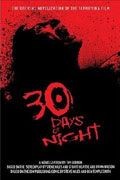
Tim Lebbon: I'd worked for Pocket Books before, when I did Hellboy: Unnatural Selection, and when this project came up they contacted me to see if I was interested. Naturally, I was.
Dark Scribe: What source materials were you given to work from? Were you using both the original comic series as well as the screenplay, or were you limited to just the screenplay?
Tim Lebbon: It was the novelization of the movie, not the comics, so although I had the comics in mind - the look of the movie is very close - I worked strictly from the screenplay.
Dark Scribe: 30 Days started as a comic book – a heavily visual medium. Film is obviously a primarily visual medium as well. How difficult was it to translate this visual property into a novel?
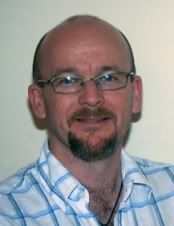 Tim Lebbon: I had a lot of fun writing the novel. It's a very action-driven movie, so obviously the novel reflected that, as well as the claustrophobia, the fear, the paranoia. And in this movie especially, the weather and landscape itself are main characters as well, affecting much of what happens.
Tim Lebbon: I had a lot of fun writing the novel. It's a very action-driven movie, so obviously the novel reflected that, as well as the claustrophobia, the fear, the paranoia. And in this movie especially, the weather and landscape itself are main characters as well, affecting much of what happens.
Dark Scribe: Describe your process in writing this novel. How much leeway were you given to add touches that weren’t in the source material?
Tim Lebbon: I worked directly from the screenplay, but I did add several scenes that I thought expanded on the story somewhat. Look out for the polar bear scene in the novel...
Dark Scribe: How closely did you work with 30 Days creator and co-scripter (with Stuart Beattie and Brian Nelson) Steve Niles?
Tim Lebbon: I didn't work with Steve at all, although we've swapped a few e-mails since I've finished the book. It was left to me to write the book.
Dark Scribe: How far in advance were you working on the book?
Tim Lebbon: I think the movie had almost finished shooting when I was writing the book, but I really had no 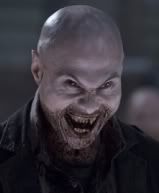 involvement in the movie side of things. I was sent the screenplay and then did what writers do - shut myself away in a little room, lived off water and dried bread, and wrote the novel.
involvement in the movie side of things. I was sent the screenplay and then did what writers do - shut myself away in a little room, lived off water and dried bread, and wrote the novel.
Dark Scribe: Were you concerned that, by the time the film came out, it would be substantially different from the book you’d written? Or were changes that were made during the filming shared with you to include in the book?
Tim Lebbon: Well, I started work, and then a couple of days into the writing I was sent the shooting script, which was quite different in several key ways. So I had to go back and basically start again, using a few small scenes from the pages I'd already done. Once the shooting script was sent, I was not informed of any major changes, so I'm hoping there were none.
Dark Scribe: Earlier, you mentioned your original Hellboy novel, Unnatural Selection. How was writing that different from writing 30 Days?
Tim Lebbon: It was all my own work, my own story and idea, so of course there was no script to follow. There were far fewer restrictions - in fact Mike Mignola was very open with the sort of story he'd allow. Hellboy is usually seen in dark corners, subterranean places, old ruined villages...I put him in front of the world's cameras fighting a dragon on the outstretched arm of the statue of Christ the Redeemer. So thanks, Mike!
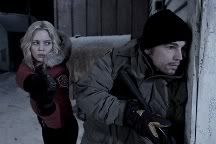 Dark Scribe: How did your approach to writing 30 Days differ from the way you approach your own, original work?
Dark Scribe: How did your approach to writing 30 Days differ from the way you approach your own, original work?
Tim Lebbon: The planning was basically done for me. I wrote scene by scene, I always knew what was coming next, and I always knew what was going to happen at the end. When writing my own novels, this is rarely the case.
Dark Scribe: Do you think this experience will influence your other work? If so, how?
Tim Lebbon: One thing I think I worked on hard and, hopefully, improved upon, was my treatment of action scenes.
Dark Scribe: Did you look at any other novelizations to get a feel for how to tackle this project?
Tim Lebbon: Nope.
Dark Scribe: Would you do novelization work again? 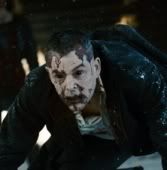
Tim Lebbon: I enjoyed it, and I'd do it again, but only if a project interested me. And from a more commercial viewpoint, it was a nice deal, and I'm hoping that some people who pick up the novelization will then drift across to some of my original novels as well.
Dark Scribe: This past September, your dark fantasy novel Dusk won the British Fantasy Society's August Derleth Fantasy Award for Best Novel. Do you see the success of Dusk and its sequel, Dawn, taking your career in a new direction?
Tim Lebbon: It's a subtle change, I guess. These books are published and marketed as fantasy, but I'm still writing novels I want to write. I'm a full-time writer now, so there does have to be a certain amount of commercial consideration in what I do, but I consider myself very lucky that I can still write stories I'm driven to write. The third fantasy novel from Bantam, Fallen, is very much something that I'd been thinking about for quite some time.
Dark Scribe: What other genres would you like to work in?
 Tim Lebbon: Anything that takes my fancy. As I said above, I write stories I want to write, and generally they fall into horror or fantasy genres. I'm working on some young adult stuff right now, because as my children grow older I find I'm wanting to write from a kid's point-of-view more and more. That's a real challenge, trying to recall and retain that sense of wonder.
Tim Lebbon: Anything that takes my fancy. As I said above, I write stories I want to write, and generally they fall into horror or fantasy genres. I'm working on some young adult stuff right now, because as my children grow older I find I'm wanting to write from a kid's point-of-view more and more. That's a real challenge, trying to recall and retain that sense of wonder.
Dark Scribe: About a year ago you announced on your website that you were able to achieve every writer’s dream – quitting the day job to write full time. What differences have you seen in your life and career since you took the leap?
Tim Lebbon: My commute to work is a lot shorter. I don't miss my old day job one single, solitary bit. I've written a lot more. Sometimes we wine and dine, sometimes we scrimp and save. I...er...talk to myself more than I ever did before. I feel far more fulfilled at the end of the day. I'm making my own living, and there's something very liberating in that. It is, without a doubt, a dream come true.
Dark Scribe: What’s coming up from Tim Lebbon?
Tim Lebbon: There's a new fantasy novel, Fallen, coming from Bantam next spring. Also next spring will be Mind the 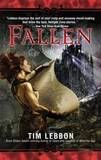 Gap, a contemporary fantasy written with Chris Golden – that’s coming from Bantam as well. It's the first in a loosely connected series we're calling “The Novels of the Hidden Cities.”
Gap, a contemporary fantasy written with Chris Golden – that’s coming from Bantam as well. It's the first in a loosely connected series we're calling “The Novels of the Hidden Cities.”
There's a two-novella volume due early next year from Subterranean Press called After the War, set in my fantasy world of Noreela. Then there's A Whisper of Southern Lights, the third novella in my Assassin Series, due soon from Necessary Evil Press. There's a collection due soon as well, and a novella from a British indie press, but they're not officially announced yet.
And I'm working on loads of other stuff - a screenplay, a TV series proposal, and two young adult trilogies.
For more information on Tim Lebbon and his books, visit his official author website and MySpace page.




Reader Comments